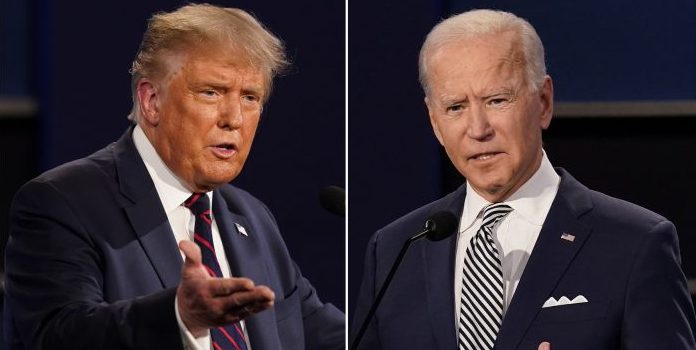(Headline USA) The campaign’s final debates between President Donald Trump and Democrat Joe Biden were thrown into uncertainty Thursday as the rival camps offered dueling proposals for the remaining faceoffs that have been upended by the president’s coronavirus infection.
The chair of the nonpartisan Commission on Presidential Debates told The Associated Press that the final debate, scheduled for Oct. 22, was still slated to go on with both candidates present as planned. But next Thursday’s debate seemed to be gone, after the Trump team objected to the commission’s format change.
The whipsaw day began with an announcement that the town hall-style affair set for Oct. 15 in Miami would be held virtually, a decision the commission made unilaterally without consulting the Trump campaign — and possibly the Biden campaign too. The commission cited health concerns following Trump’s infection as the reason for the change.
Trump said he wouldn’t participate if the debate wasn’t in person. Biden’s campaign then suggested the event be delayed a week until Oct. 22, which is when the third and final debate was already scheduled.
Next, Trump countered again, agreeing to a debate on Oct. 22 — but only if face to face — and asking that a third contest be added on Oct. 29, just before the election. But Biden’s advisers rejected squaring off that late in the campaign.
After the release late Thursday of a letter from Trump doctor Navy Cmdr. Sean Conley that the president had “completed his course of therapy” and could resume campaigning this weekend, the Trump campaign called on the commission to hold next week’s debate in person as originally scheduled.
“There is therefore no medical reason why the Commission on Presidential Debates should shift the debate to a virtual setting, postpone it, or otherwise alter it in any way,” said Trump campaign manager Bill Stepien.
But commission chair Frank Fahrenkopf said late Thursday that the decision to hold the debate virtually, guided by its medical advisers at the Cleveland Clinic, was not going to be reversed.
The commission said it made the announcement in order to “protect the health and safety of all involved,” including the everyday citizens invited to ask questions of the candidates.
The debate commission already came under scrutiny after the first debate between Trump and Biden deteriorated, with the president frequently interrupting his opponent and the moderator unable to take control.
The Oct. 22 debate in Nashville, Tennessee, is scheduled to feature a format similar to the first. Biden’s campaign has suggested that it be modified to the “town meeting” format, though the Trump campaign has not weighed in.
Founded after the 1984 presidential election, the commission has organized every general election debate since 1988 — and typically selects the dates, moderators, formats and locations without input from the candidates.
Biden moved quickly to make sure he would still appear in front of a television audience next week. Instead of debating Trump on Thursday, he will take part in a town hall sponsored by ABC News. As he campaigned in Arizona, Biden said he would indeed attend the Oct. 22 debate.
“We agreed to three debates back in the summer,” Biden said. “I’m showing up. I’ll be there. And if, in fact, he shows up, fine. If he doesn’t, fine.”
In an interview with Fox Business anchor Maria Bartiromo shortly after the commission’s announcement, Trump insisted he was in “great shape” and called the idea of a virtual debate a “joke.”
“I’m not going to do a virtual debate,” he declared.
Stepien said Trump would stage a rally rather than debate next Thursday.
Adapted from reporting by Associated Press.

